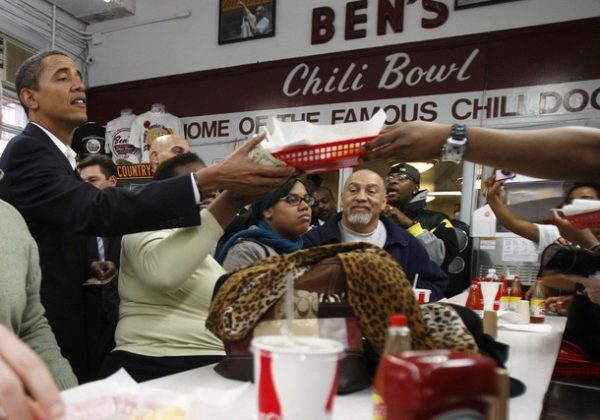Notes
The Last Presser… And The Real Bush

Alternately wounded, aggrieved, persecuted and somehow fundamentally misunderstood, me thinks he doth protest … all the way to the history books.
***
I just finished watching the whole 45 minutes of Bush’s final press conference on Monday (as opposed to responding strictly to the photos and a radio interview with NPR White House correspondent Don Gagne, as I did in the previous post).
Abandoning his typical act as a tightly scripted pitchman, Bush — cycling through bitterness, defensiveness and anger — seemed intent on putting almost every single controversial and misguided thing he had done as President on the table so, like a defendant acting as his own counsel, he could make, and declare for the record, a defense of every significant action of his tenure. (The rationalization about Katrina was particularly thin and pathetic — that it would have been unconscionable to land in Baton Rouge and divert all those resources on the ground … when that’s exactly what he did on all the CYA trips he made.)
Throughout his term, Bush insisted that he didn’t reflect, didn’t look back, didn’t pay attention to criticism. Yet, what Bush explained as well as demonstrated in this press conference was that he was thoroughly immersed in the criticism, as if it all tumbled this hour for him to fire back.
I suppose I preserve these moments because it’s some relief to finally match the real attitudes to these characteristic facial gestures, as well as to see, as if for the first and only time, the real unguarded Bush.
At least starting off, Bush plied the press with awkward teasing and back-handed humor, these little moments of smugness seeming to create brief islands of protection from the hurt and defensiveness he was feeling, and from the tension between him and the reporters. In the C-SPAN screen grab above, the President gets a kick out of having said his name in French after acquiescing to-, then making a joke out of the proper pronunciation of “Suzanne Malveaux.” (End of the part 1 segment.)
Bush was plaintive and emphatic throughout, often hanging his chin in the air after offering one reference after another to what he evidently deemed un- or under-appreciated accomplishments, listing most of these off without ever having been asked. In the example above, at the 7:11 mark in part 1, Bush has just finished a digression from a question about Israel’s right to defend itself, emphasizing how his administration had helped the Palestinians establish democracy.
In the sequence above, from about the 5:20 mark in part 2, Bush uses utterly childish and concescending tones and gestures to mock what he intimates as the hand-wringing, weak-kneed thinking of doubters who opposed the “surge.”
Quite a few time, Bush’s composure simply disintegrated.
At one point (around 7:15 of part 2), he vigorously lashed out at critics who questioned his “chucking aside of his free market principles” in support of the Wall Street bail-out, arguing testily that nothing short of the threat of a depression made him do it. Just above (at the 5:19 point of part 4), we see Bush ranting about criticism of America’s preparation for 9/11 and the charge that the Administration never “connected the dots.” (The image next to it reveals the tortured reaction of White House staffers Gillespie and Perino.)
Looking again at the image in the previous post, I can’t place where in the press conference it occurred but it looks a lot less like starry-eyed than one of those many moments of upset self-righteousness.
The painful awkwardness of the entire episode — the press briefing itself, but also the way it summed up and exposed a dysfunctional presidency — is plain on the faces of the reporters. Looking at the pregnant image from today’s NYT above, what do you do in that moment but simply stare straight ahead and wait until the man is gone?








Reactions
Comments Powered by Disqus